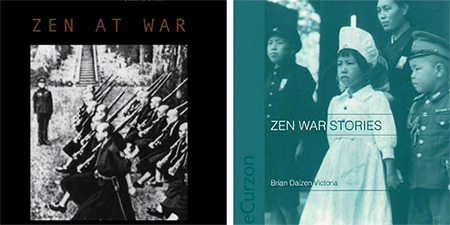Friday, November 17, City Center, 300 Page Street, SF
4 – 5:30 pm in the Dining Room – Film: “Zen and War” with a discussion to follow
7:30 – 9 pm in the Dining Room – Can Meditation Kill?: The Abuse/Use of Meditation in Imperial Japan: Presentation and discussion in the dining room
 “Zen and War”
“Zen and War”
4 – 5:30 pm in the Dining Room
Brian Victoria’s book Zen At War was published in 1998, detailing how Japanese Buddhist monks and their religious organizations actively encouraged and participated in Japan’s expansionist wars. [This film] Zen and War features contemporary Zen Buddhist teachers speaking of their wartime predecessors’ collaboration for the first time on film.—From description of the film on Clear View Project Products web site.
Can Meditation Kill?: The Abuse/Use of Meditation in Imperial Japan
7:30 – 9 pm in the Dining Room
Samādhi and the mental power associated with it lay at the heart of Zen meditation, i.e. zazen. Without samādhi, Zen meditation would become just another “mental health” practice instead of the basis for a profound realization of the true nature of the self. Yet, inasmuch as this long-acknowledged mental power constitutes an indivisible and integral part of samādhi, there is the ever-present danger that it can be misused or abused by oneself and/or others. The abuse described in this presentation, while rooted in pre-modern Japan, was most clearly visible during the period of Japan’s modern military aggression, beginning with the Sino—Japanese War of 1894-95 and extending through Japan’s ultimate defeat in the Asia—Pacific War (1937-1945). During this period, samādhi power was, among other uses, employed to enhance the meditator’s ability to kill others. This presentation focuses on the abuse of samādhi power within Imperial Japan (1868-1945) with the express hope that once exposed and understood, its abuse will never be repeated.
 Brian Victoria is a native of Omaha, Nebraska and a 1961 graduate of Nebraska Wesleyan University in Lincoln, Nebraska. He holds a M.A. in Buddhist Studies from Sōtō Zen sect-affiliated Komazawa University in Tokyo, and a Ph.D. from the Department of Religious Studies at Temple University.
Brian Victoria is a native of Omaha, Nebraska and a 1961 graduate of Nebraska Wesleyan University in Lincoln, Nebraska. He holds a M.A. in Buddhist Studies from Sōtō Zen sect-affiliated Komazawa University in Tokyo, and a Ph.D. from the Department of Religious Studies at Temple University.
In addition to a 2nd, enlarged edition of Zen At War (Rowman & Littlefield, 2006), Brian’s major writings include Zen War Stories (RoutledgeCurzon, 2003); an autobiographical work in Japanese entitled Gaijin de ari, Zen bozu de ari (As a Foreigner, As a Zen Priest), published by San-ichi Shobo in 1971; Zen Master Dōgen, coauthored with Prof. Yokoi Yūhō of Aichi-gakuin University (Weatherhill, 1976); and a translation of The Zen Life by Sato Koji (Weatherhill, 1972). In addition, Brian has published numerous journal articles, focusing on the relationship of not only Buddhism but religion in general, to violence and warfare.
From 2005 to 2013 Brian was a professor of Japanese Studies and director of the AEA “Japan and Its Buddhist Traditions Program” at Antioch University in Yellow Springs, OH. From 2013 to 2015 he was a Visiting Research Fellow at the International Research Center for Japanese Studies in Kyoto, Japan. Brian currently continues his research as a Fellow of the Oxford Center for Buddhist Studies, finishing a book on Buddhist-related domestic acts of terrorism in 1930s Japan. He is a fully ordained Buddhist priest in the Sōtō Zen sect.
Many of Brian’s articles are available at the website of The Asia-Pacific Journal: Japan Focus.
Additional articles may be found on The Zen Site.











